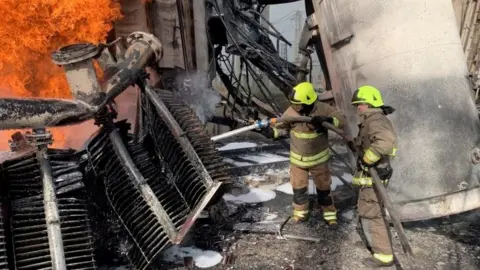Ukraine war: Nato denounces Russia's 'dirty bomb' claim
 Reuters
ReutersNato's secretary general has warned Russia over its "false" claim that Kyiv might use a "dirty bomb" - conventional explosives laced with radioactive material.
Jens Stoltenberg tweeted that the Nato allies "reject this allegation" and "Russia must not use it as a pretext for escalation".
Russian Defence Minister Sergei Shoigu made the dirty bomb remarks in a call with his UK counterpart Ben Wallace.
Ukraine also condemned the remarks.
President Volodymyr Zelensky said this meant Russia itself could be preparing an attack of this kind.
On Sunday, Mr Shoigu also held a flurry of phone calls with the defence ministers of the US, France and Turkey, voicing Moscow's alarm. He provided no evidence to back up his accusations.
He said he was "concerned about possible provocations by Kyiv involving the use of a dirty bomb".
Other top Russian commanders made the same allegation.
But in a joint statement, the foreign ministers of France, the UK and the US said their governments "all reject Russia's transparently false allegations that Ukraine is preparing to use a dirty bomb on its own territory", stressing that they would continue supporting Ukraine in "the face of President [Vladimir] Putin's brutal war of aggression".
Military analysts note that the Russian accusations come after a string of heavy Russian military defeats and as Ukrainian troops continue their counter-offensive operations in the east and south of the country.
Since Russia invaded Ukraine in February 30-nation Nato has provided Kyiv with billions of dollars' worth of weapons and military training, but it refuses to intervene directly - with air support or troops - as Ukraine is not a member.
President Zelensky accused Russia of being "the source of everything dirty that can be imagined in this war".
He said Russia was threatening the world "with a radiation disaster" at the Zaporizhzhia nuclear plant which it had captured, and also spoke of Moscow's threats to detonate a major dam in southern Ukraine. The Kremlin denies the allegations.
The Ukrainian leader said "the world should react in the toughest possible way".
Meanwhile, Mr Wallace said he rejected Mr Shoigu's allegations that "Ukraine was planning actions facilitated by Western countries, including the UK, to escalate the conflict in Ukraine".
He also cautioned that such claims "should not be used as a pretext for greater escalation".
The US-based Institute for the Study of War (ISW) said in a series of tweets that Mr Shoigu "likely sought to slow or suspend Western military aid to Ukraine and possibly weaken the Nato alliance in scare-mongering calls".
However, the ISW added: "The Kremlin is unlikely to be preparing an imminent false-flag dirty bomb attack. Shoigu's claims further a longstanding Russian information campaign."
In other developments on Sunday:
- Ukraine's state energy company said it had partially restored electricity supplies following massive Russian missile and drone strikes
- Russia's RT state broadcaster said it was suspending its senior employee Anton Krasovsky, after he was heard saying in a TV programme that Ukrainian children should be drowned or burned to death
- Ukraine's security service SBU confirmed that Vyacheslav Bohuslayev, former head of the Motor Sich company, was arrested after being accused of illegally selling aviation engines to Russia


